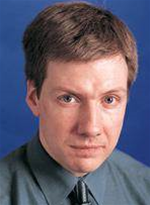David Wheeler, who sadly died on December 13 last year, was one of those people behind the scenes. David worked at the Cambridge Computer Lab, back in the days before there was a computer industry worth speaking of. David and his associates (which included, I'm proud to say, my parents) worked on early computing systems, including EDSAC 2 – arguably the first computer to be used for real research outside the computing field (for example, in determining the structure of DNA).

These days, it's very easy to forget that things we take for granted today have not been around forever. I'm not thinking of high technology here, but simple concepts such as interrupt processing, a library of subroutines and a video display. These were all developed at Cambridge and are used by every PC user on the planet, the vast majority of whom are oblivious to their origins.
David was also a significant player in computer security. The Cambridge Computer Lab has long been an excellent source of innovative and professional security research, and has produced a number of industry experts and seminal papers in fields such as ATM security, smartcards, TEMPEST and cryptography. Reading many of those papers, you will frequently find a credit to David Wheeler for valuable discussions and advice.
David also published a number of papers himself, including the TEA encryption algorithm (jointly with Roger Needham, also of Cambridge and also sadly deceased), which is short enough to memorise, yet still provides good security. He also made some innovative suggestions on improving the security of online payment systems.
I only actually met David once, but had a lengthy and fascinating conversation on a range of security issues. Like many old-fashioned academics, he was well-rounded, and just as comfortable discussing historical matters with my sister, a history teacher.
It is very easy to forget the hard work on which our industry is built. I would like to take this opportunity to thank all those behind the scenes, past and present, whose efforts have made it what it is today.

_(23).jpg&h=140&w=231&c=1&s=0)


_(20).jpg&h=140&w=231&c=1&s=0)





 Cyber Resilience Summit
Cyber Resilience Summit
 iTnews Executive Retreat - Security Leaders Edition
iTnews Executive Retreat - Security Leaders Edition
 Huntress + Eftsure Virtual Event -Fighting A New Frontier of Cyber-Fraud: How Leaders Can Work Together
Huntress + Eftsure Virtual Event -Fighting A New Frontier of Cyber-Fraud: How Leaders Can Work Together
 iTnews Cloud Covered Breakfast Summit
iTnews Cloud Covered Breakfast Summit
 Melbourne Cloud & Datacenter Convention 2026
Melbourne Cloud & Datacenter Convention 2026












_(1).jpg&h=140&w=231&c=1&s=0)



